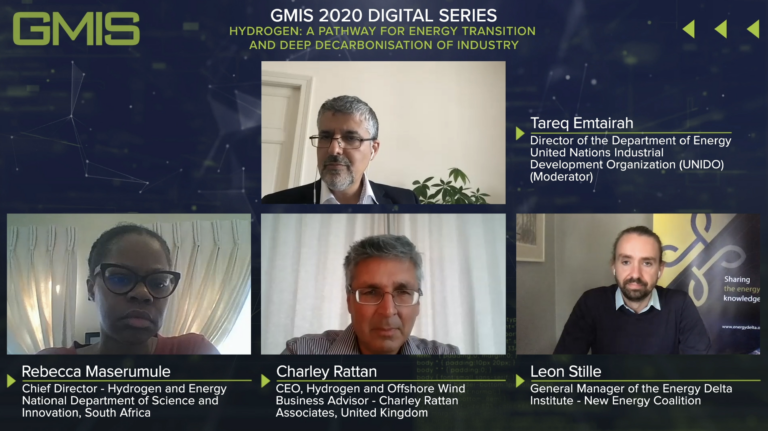Green hydrogen solutions have the potential to revolutionise the global energy system and lead to decarbonisation of heavy industry and transport within the next decade, especially in the hard-to-abate sectors. However a virtual panel of sustainable energy experts convened by the Global Manufacturing and Industrialisation Summit’s #GMIS2020 Digital Series emphasised that the pace of this transition is being hindered by regulatory and non-regulatory barriers worldwide.
The session, entitled Hydrogen: A Pathway for Energy Transition and Deep Decarbonisation of Industry featured a distinguished panel of experts. Tareq Emtairah, director, department of energy, United Nations Industrial Development Organisation (UNIDO) noted that the falling costs and the urgency of cutting greenhouse gas (GHG) emissions had given hydrogen “unprecedented political and business momentum,” and that, “hydrogen is seen as a clean fuel that is emission-free upon utilisation with water,.”
Charley Rattan, hydrogen and offshore wind business advisor of Charley Rattan Associates, stressed that while there is much talk about the potential of hydrogen from energy providers and policymakers, the infrastructure is already largely in place to make it a scalable energy solution.
“It’s been called the ‘Swiss Army Knife’ of solutions, it’s been around a long time in the UK, and it means that the existing gas grid can largely use hydrogen,” he said. “So you don’t need to rip up the entire infrastructure, you just need to modify the pipe structure, line it, make sure it doesn’t escape, deal with embrittlement, and the testing of the appliances,” said Rattan, adding that the UK has a four-point strategy for the rollout of hydrogen.
Rattan cited regulation as the key to enabling hydrogen projects in the near future but as they were often drafted more than a century ago, they “often don’t match with the reality” of today. “The whole thing needs to be rethought here before you get projects into the ground. You have to meet existing requirements, and if the existing requirements are not fit for purpose, it’s going to take a little bit of time,” stressed Rattan.
In concluding the session, Emtairah cited a number of consensus points from the panel, notably:
- That international organisations such as UNIDO can play a role in raising awareness and engagement on the demand side, making sure that the benefits of hydrogen energy are clearly articulated and visible;
- The need for continuous funding of innovation with respect to hydrogen;
- Regulatory and non-regulatory barriers (e.g. low levels of knowledge of hydrogen, high costs, perceptions of safety issues and a lack of updated health and safety standards for hydrogen power etc.) need to be overcome to deploy hydrogen to its maximum potential.
- Multi-stakeholder partnership processes are vital to creating an enabling environment for hydrogen projects in the mid-term.
The session is available to watch on-demand at https://bit.ly/2YHVHyY





